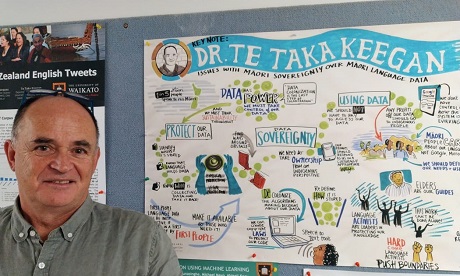ChatGPT seems to be taking over te reo Māori. The new artificial intelligence (AI) has academics and te reo speakers worried.
The chatbot is a quick learner.
Ever since its launch last November, ChatGPT has ‘learned’ to write in te reo. The quality is “scarily good”, says Waikato University’s Te Taka Keegan (pictured).
But he has a question.
“If they are producing a very good quality of Māori … where did they get their data from?”
Perhaps AI scraped it from social media sites. If so, it’s a worry, he says.
That’s because the chatbot’s results are so good, the language could shift from a traditional reo to a ChatGPT version, which might mean Māori lose sovereignty over their language.
“We’ve lost a lot of control over our land, … the education that our children get; our own data and our own stories is kind of our last control over ourselves. If … we lose sovereignty over that, it doesn’t bode well for the uniqueness that is Māori.”
Ngapera Riley is worried about the ethics of information, data sovereignty and te reo.
Her company, Figure.NZ, works to democratise New Zealand data – but the way information is gathered and misused is concerning, she says.
“Once we open it, it’s out there, right? But we’ve decided it is better to let people use the information and access it, than to hide it.”
ChatGPT shouldn’t be used as a primary source, but as a tool, she stresses. Its results still need human auditing.
“That’s where it will get dangerous, if people start to get too lazy and just start using it like that [as a primary source].”
Sonny Ngatai is optimistic te reo Māori can survive AI. He wants to see the language used everywhere.
But ChatGPT needs some boundaries, Ngatai says.
“Where I would put my flag up for data sovereignty is when it comes to our stories, or our narratives, or our tikanga, stuff like that.”
Protecting Māori intellectual property rights in those situations is important, he says. “It’s not just a matter of stringing words together like a chatbot could.
“It’s part of our identity, part of who we are as New Zealanders. There is just so much more to the language then an AI being able to translate what you want to say.”
What now?
Even though there are challenges, Keegan is generally positive about AI.
That would mean isolating the chatbot’s data source, using Māori to train it and then controlling it at an iwi level. If that could be organised, Māori could retain sovereignty and use the AI as a helpful tool.
Riley is also positive about what ChatGPT can offer. However, Māori must be actively involved.
“My hope is that tools like ChatGPT can help preserve and use [te reo], but we still need the human element to input into the language, and to check that we aren’t using incorrect sources,” Riley says.
Source
Additional readingNews category: Great reads, New Zealand.




